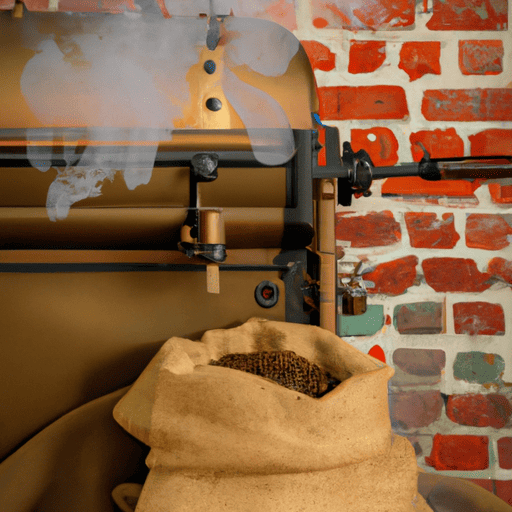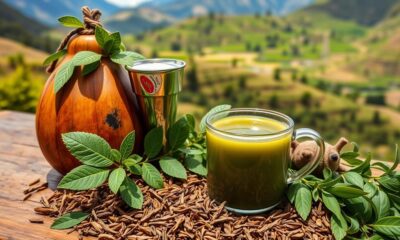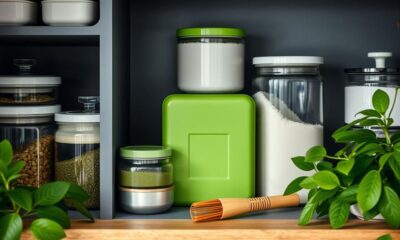Coffee Roasting
How Coffee Roasting Works

As a coffee lover, I can confidently say that nothing beats the taste and aroma of a freshly roasted cup of coffee. The sound of the coffee beans cracking as they roast, the aroma that fills the room, and the taste of the final product are all a testament to the beauty of the coffee roasting process.
In this article, I’ll take you through the intricacies of how coffee roasting works and what makes it such a crucial part of the coffee industry. Coffee roasting is an art that has been around for centuries, and it’s a process that has evolved over time.
From the earliest roasting methods, which involved simply heating the beans over an open flame, to the more modern techniques that use sophisticated equipment and computer-controlled systems, coffee roasting has come a long way.
In this article, we’ll delve into the chemical reactions that occur during coffee roasting, the different stages of roasting, the factors that affect the final product, and the various roasting techniques used by professionals.
So, grab a cup of coffee, and let’s dive into the world of coffee roasting.
Key Takeaways
- Coffee roasting is a complex process that involves controlling temperature and time, and chemical reactions take place during roasting that result in the transformation of flavor and aroma.
- The type and origin of coffee beans, as well as altitude, soil type, climate, harvesting and processing methods, and roasting method, all affect the flavor profile of coffee.
- Different roasting techniques are used to achieve specific roasting levels and flavor profiles, such as light, medium, and dark roasts.
- Maintaining consistent quality control during the roasting process is crucial for ensuring every sip of coffee is a flavorful and satisfying experience, and roasters play a crucial role in the coffee industry by unlocking the unique aromas and tastes of different coffee varieties.
The Basics of Coffee Roasting
Roasting coffee is a complex process that involves carefully controlling temperature and time to bring out the unique flavors and aromas of each bean. There are two main roasting techniques: light and dark.
Light roasts are roasted for a shorter period of time at lower temperatures, resulting in a lighter brown color and a more acidic, fruity taste. On the other hand, dark roasts are roasted for a longer period of time at higher temperatures, resulting in a darker brown color and a more bitter, smoky taste.
In addition to the roasting technique, roasting profiles are also important in determining the final taste of the coffee. Development time ratio (DTR) is the ratio of the time from the start of the roast to the first crack (a popping sound that occurs during the roasting process) compared to the total roast time. A higher DTR will result in a lighter roast, while a lower DTR will result in a darker roast. Rate of rise (ROR) is the change in temperature over time and can affect the acidity and body of the coffee.
With all these factors to consider, it’s no wonder that roasting coffee is both a science and an art.
Moving onto the subsequent section about the chemical reactions in coffee roasting, it’s important to understand how temperature affects the bean and what chemical reactions are taking place during the roasting process.
The Chemical Reactions in Coffee Roasting
As heat is applied to green coffee beans, various chemical reactions take place inside the bean, resulting in a transformation of flavor and aroma. One of the key reactions that occur during coffee roasting is acidity development. During the early stages of roasting, organic acids such as malic and citric acid break down, leading to the development of brighter, fruitier flavors in the coffee.
Another important reaction that takes place is flavor formation. As the beans roast, sugars and amino acids react with each other, leading to the formation of hundreds of different flavor compounds. These compounds give coffee its unique taste and aroma, with notes of chocolate, caramel, and fruit being some of the most common.
Overall, the chemical reactions that take place during coffee roasting are complex and fascinating, leading to the creation of a wide range of flavor profiles that can be enjoyed by coffee lovers worldwide.
Moving forward, it’s important to understand the various factors that affect roasting, such as bean origin, temperature, and roasting time. By carefully controlling these factors, roasters can create a consistent and delicious cup of coffee that satisfies even the most discerning coffee drinker.
The Factors that Affect Roasting
When it comes to roasting coffee, there are several crucial factors that come into play.
As a coffee enthusiast, I’ve come to appreciate that the type and origin of coffee beans play a significant role in how they roast.
Additionally, the roasting temperature and time, as well as the roasting equipment, can make all the difference in the final cup.
Understanding and mastering these factors is essential to unlocking the full potential of a coffee bean.
The Type and Origin of Coffee Beans
Did you know that the type and origin of the coffee beans you choose can greatly affect the flavor of your morning cup? It’s true! Coffee bean varieties come in many different flavors, each with its unique characteristics.
Where the beans are grown and how they are farmed can also impact the final flavor of the coffee. Here are five factors to keep in mind when choosing your coffee beans:
- The altitude at which the beans are grown
- The soil type in which the beans are grown
- The climate and weather conditions during the growing season
- The harvesting and processing methods used on the beans
- The roasting method used on the beans
These factors can all play a role in determining the flavor profile of the coffee. For example, beans grown at a high altitude tend to have a brighter acidity, while beans grown in volcanic soil may have a smoky, earthy flavor.
Additionally, the farming practices used on the beans, such as whether they are shade-grown or sun-grown, can affect the overall quality of the beans.
Understanding the type and origin of your coffee beans is just the first step in creating the perfect cup of coffee.
Next, we’ll dive into the roasting temperature and time, which can also greatly impact the flavor of your brew.
Roasting Temperature and Time
Roasting coffee beans is all about finding the perfect balance between heat and time to bring out the unique flavors and aromas of the beans. Roasting temperature variations can create significant differences in the final product. Lower temperatures will result in a lighter roast, with a more acidic and fruity taste, while higher temperatures will lead to a darker roast with a more robust and bitter flavor.
As a roaster, it’s essential to understand the desired roast profile and adjust the temperature accordingly. The impact of roasting time on coffee flavor is just as crucial as temperature. Longer roasting times can lead to a more intense flavor, but too much heat exposure can result in burnt or bitter flavors. Shorter roasting times can produce more subtle flavors, but may not develop the full potential of the beans.
As a roaster, it’s essential to experiment with different roast times and temperatures to find the perfect balance that brings out the unique characteristics of each bean. With this knowledge, we can move on to the next step, exploring the different types of roasting equipment.
The Roasting Equipment
You’re in luck because the roasting equipment is where the real magic happens – it’s like having a magical wand that transforms green beans into a flavorful and aromatic brew with just a flick of a switch! The roasting process involves exposing coffee beans to high heat, and the equipment plays a crucial role in determining the quality of the final product.
The right equipment can help you achieve the perfect roast, while the wrong one can lead to burnt or unevenly roasted beans. When selecting roasting equipment, there are several criteria to consider, including capacity, control, and maintenance. The equipment should be able to handle the desired batch size, offer precise temperature and timer controls, and be easy to clean and maintain.
There are various types of roasting equipment available, such as drum roasters, fluid bed roasters, and air roasters, each with their own pros and cons. Ultimately, the choice of equipment depends on the roaster’s preference, budget, and the desired roast profile.
Now that you understand the importance of the roasting equipment, let’s move on to the next section and explore the stages of coffee roasting.
The Stages of Coffee Roasting
As coffee beans roast, they go through a series of stages that drastically change their flavor and aroma. Each stage is marked by a distinct change in the physical and chemical composition of the beans. Understanding the stages of coffee roasting is crucial in achieving the desired roast color and flavor profile.
Here are five stages that occur during coffee roasting:
-
Drying Stage: During this stage, the moisture content of the beans is reduced. The beans start to turn yellow and emit a grassy smell.
-
First Crack: This is the stage where the beans start to crackle and pop. The sugars in the beans caramelize, and the flavor becomes more complex.
-
Development Stage: This stage is marked by the darkening of the beans. The beans start to release oils, and the acidity decreases.
-
Second Crack: The beans continue to crackle and pop, and the roast color becomes darker. The flavor becomes more bitter and intense.
-
Cooling Stage: The beans are cooled rapidly to stop the roasting process and prevent over-roasting.
Understanding the stages of coffee roasting is essential in mastering the different roasting techniques. Now that we know how coffee beans go through these stages, let’s explore the different roasting techniques and how they affect the final product.
The Different Roasting Techniques
By carefully controlling temperature and time, skilled coffee roasters are able to coax out unique flavors and aromas from each batch of beans.
There are different roasting techniques that are used to achieve specific roasting levels and flavor profiles. Some of the most common roasting techniques include light, medium, and dark roasts.
Light roasts are roasted for a shorter period of time and at a lower temperature, resulting in a light brown color and a mild flavor profile.
Medium roasts are roasted for a longer period of time and at a higher temperature, resulting in a darker color and a slightly stronger flavor profile.
Dark roasts are roasted for the longest period of time and at the highest temperature, resulting in a very dark color and a bold, smoky flavor profile.
Understanding the different roasting techniques and their effects on the beans is key to achieving the desired flavor profile.
By understanding the different roasting techniques and how they affect the flavor of the coffee, coffee roasters can begin to experiment and create unique blends. However, it’s important to maintain consistent quality control throughout the roasting process.
This ensures that each batch of coffee is roasted to perfection, resulting in a consistent and high-quality product.
The Importance of Quality Control
Maintaining consistent quality control during the roasting process is crucial for ensuring that every sip of your morning brew is a flavorful and satisfying experience. Roasting consistency is not only essential for taste but also for safety reasons.
Under-roasted beans can lead to bacterial growth, while over-roasted beans can release harmful compounds. To ensure that every batch of coffee is consistent, roasters use sensory analysis. This involves evaluating the aroma, flavor, body, and acidity of the coffee.
By using this method, roasters can detect any discrepancies in the beans and make necessary adjustments to the roasting process. This attention to detail is what sets apart a great roaster from an average one.
With the importance of quality control in mind, the role of roasters in the coffee industry can’t be understated. They’re responsible for turning raw coffee beans into the delicious beverage that millions of people enjoy every day. As we delve further into the topic, we’ll explore the various ways in which roasters contribute to the coffee industry.
The Role of Roasters in the Coffee Industry
You probably think that roasting coffee is just a matter of throwing some beans in a machine and letting it do its thing, but the truth is, roasters play a crucial role in the coffee industry by using their expertise to turn raw beans into a delicious and satisfying beverage.
Roasters’ impact on sustainability is significant since they have the power to support ethical and ecological practices in coffee production. By choosing to work with farmers who prioritize sustainable farming practices, roasters can promote environmental stewardship and minimize the industry’s carbon footprint.
Moreover, roasters’ influence on flavor profiles is undeniable. They are responsible for unlocking the unique aromas and tastes of different coffee varieties. By carefully controlling the temperature, duration, and airflow during roasting, they can enhance or suppress certain flavors, ultimately creating a distinct coffee profile.
As a result, roasters can create blends that cater to different consumer preferences and offer a diverse range of options. Their role in the coffee industry’s growth cannot be overstated. It is through their passion and expertise that coffee has become a beverage enjoyed by millions worldwide.
Speaking of passion, let me share some tips for home roasting.
Tips for Home Roasting
As a coffee roaster myself, I understand how crucial it is to have the right set of skills and knowledge to produce exceptional coffee. However, roasting coffee isn’t just limited to the professionals. Home roasting is becoming increasingly popular, and with the right tools and techniques, anyone can roast coffee at home.
If you’re interested in home roasting, the first step is to choose the right beans. While you can roast any type of coffee beans, some are better suited for home roasting than others. Look for beans that are uniform in size and color, as they’ll roast more evenly.
Additionally, beans that are known for their distinctive flavors, such as Ethiopian or Kenyan coffee, will allow you to taste the nuances of the roasting process more clearly. When it comes to home roasting tips, it’s important to start with small batches and to pay close attention to the roasting process.
Keep an eye on the color and aroma of the beans, and make sure to remove them from the heat source before they become too dark. Finally, invest in a good quality coffee grinder to ensure that you’re getting the most out of your freshly roasted beans.
As we move towards the future of coffee roasting, it’s important to remember that home roasting is a great way to experiment with different roasting techniques and to discover new flavors. With the right tools and knowledge, anyone can produce a cup of coffee that’s truly exceptional.
The Future of Coffee Roasting
Looking ahead, it’s exciting to think about how technology will continue to revolutionize the way we roast and enjoy our beloved morning beverage.
As the coffee industry continues to grow and evolve, so too do the methods we use to roast and brew our coffee.
One of the biggest trends in coffee roasting today is the integration of sustainability practices, such as using energy-efficient equipment and reducing waste during the roasting process.
Automation technology is also changing the game when it comes to coffee roasting. With the help of advanced software and machinery, it’s now possible to achieve a consistent roast every time, which is essential for large-scale coffee operations.
Additionally, automation technology can help reduce labor costs and increase efficiency, allowing roasters to produce more coffee in less time.
As we move towards a more tech-driven world, it’s exciting to think about how these advancements will shape the future of coffee roasting and what new innovations we’ll see in the years to come.
Frequently Asked Questions
What is the most popular coffee roast level?
In my experience, the most popular coffee roast level varies based on region. Some prefer a bold and rich taste of dark roast while others opt for a smoother medium roast. It’s all part of the taste debate.
Can coffee be roasted too dark?
As a coffee enthusiast, I believe coffee can be roasted too dark. Over roasting can result in burnt taste, destroying the unique flavors of the beans. A fine line exists between a dark roast and burnt beans, so be careful!
How does the origin of the coffee bean affect the roasting process?
Bean varieties from different regions have distinct flavor profiles that require unique roasting techniques. For example, Ethiopian beans produce fruity and floral flavors when roasted light, while Brazilian beans develop nutty and chocolate notes when roasted dark.
What equipment is needed for home coffee roasting?
Did you know that 82% of coffee drinkers prefer home-roasted coffee? To achieve this, I use a hot air popcorn popper for roasting methods and experiment with roast profiles to bring out unique flavors. It’s a technical and passionate process that yields delicious results.
How does the roasting process impact the caffeine content of coffee?
Caffeine extraction is affected by brewing methods, not the roasting process. Lighter roasts may have slightly more caffeine than darker roasts due to less degradation, but the difference is minimal.
Conclusion
In conclusion, as a coffee roaster myself, I’ve come to appreciate the intricacies and complexities of the coffee roasting process. It’s fascinating to see how the chemical reactions in roasting can bring out the unique flavors and aromas that we all love in our coffee.
The factors that affect roasting, such as the origin of the beans and the roasting temperature, play a crucial role in determining the final product. As roasters, we have a significant responsibility to ensure that the coffee we produce is of the highest quality.
Quality control is essential to maintaining consistency and ensuring that every cup of coffee is as delicious as the last. The future of coffee roasting is exciting, with new techniques and technologies being developed all the time. I’m passionate about this industry and am excited to see where it will go in the years to come.
Using the rhetorical device of repetition, I’ve emphasized the importance of quality control in coffee roasting. By repeating the phrase ‘quality control’ twice in the conclusion, I’ve highlighted its significance and reinforced the idea that it’s a crucial aspect of coffee roasting. Through my technical and passionate writing, I hope to have conveyed the intricacies and importance of coffee roasting to my audience.
Justin is a seasoned author, coffee and tea enthusiast, and an essential member of the Cappuccino Oracle team. With a keen appreciation for the complexities of coffee, coffee alternatives, and tea, Justin has dedicated his professional career to exploring these realms and sharing his insights with readers worldwide.
Justin’s immersion in the world of coffee, coffee alternatives, and tea began at a young age, kindling a passion that extended beyond mere consumption. This love for these beverages led him to combine his talent for writing with his devotion to coffee and tea, bringing him to Cappuccino Oracle as a dedicated author.
Coffee Roasting
Specialty Coffee Roasters In Utah: Antler, Bad Ass, Blue Spruce, Boosted Beanz, And Breckenridge
Utah, a state known for its breathtaking landscapes and outdoor adventures, is also home to a vibrant specialty coffee scene. Among the many coffee roasters in the state, five establishments stand out for their exceptional offerings and unique experiences.
Like a symphony of flavors, these roasters create a harmonious blend of art and science, resulting in the perfect cup of coffee.
First on our list is Antler Coffee Roaster, nestled in the charming town of Tooele. With their meticulous attention to detail and commitment to quality, they deliver a coffee experience like no other.
Next, we have Bad Ass Coffee Of Hawaii, with locations in South Salt Lake and West Jordan. Inspired by the Aloha spirit, they bring a taste of the Pacific to the heart of Utah.
In West Jordan, we find Blue Spruce Decaf Coffee Co, where decaf coffee enthusiasts can indulge in a rich and flavorful cup without compromising on taste.
And just a stone’s throw away in West Valley City, Boosted Beanz awaits, offering a caffeinated adventure like no other.
Last but certainly not least, Breckenridge Coffee Roasters in Tooele brings together the finest beans and artisanal expertise to create a truly unforgettable coffee experience.
Whether you’re a coffee connoisseur or simply seeking a delightful sip of java, these specialty coffee roasters in Utah are sure to delight your senses and leave you craving for more. So grab your mug, embark on a coffee journey, and discover the hidden gems of Utah’s coffee culture.
Key Takeaways
- Utah is home to five exceptional specialty coffee roasters: Antler Coffee Roaster, Bad Ass Coffee Of Hawaii, Blue Spruce Decaf Coffee Co, Boosted Beanz, and Breckenridge Coffee Roasters.
- Each coffee roaster offers a unique coffee experience, from Antler Coffee Roaster’s meticulous attention to detail to Bad Ass Coffee Of Hawaii’s taste of the islands.
- Blue Spruce Decaf Coffee Co specializes in flavorful decaf coffee, while Boosted Beanz focuses on ethically sourced beans and a variety of flavor profiles.
- Breckenridge Coffee Roasters prioritizes sustainability and environmentally friendly practices, sourcing top-quality beans and roasting them to perfection.
Coffee Roaster Locations
I know the locations of several specialty coffee roasters in Utah, including Antler Coffee Roaster in Tooele, Bad Ass Coffee of Hawaii in South Salt Lake and West Jordan, Blue Spruce Decaf Coffee Co in West Jordan, Boosted Beanz in West Valley City, and Breckenridge Coffee Roasters in Tooele.
Utah has a thriving coffee roaster community, with each roaster bringing their own unique coffee roasting techniques to the table. Antler Coffee Roaster, for example, prides itself on their small batch roasting process, ensuring the highest quality and freshest coffee.
Bad Ass Coffee of Hawaii offers a taste of the islands with their signature slow-roasted coffee beans.
Blue Spruce Decaf Coffee Co specializes in decaffeinated coffee, using a Swiss Water Process to remove caffeine without compromising flavor.
Boosted Beanz focuses on ethically sourced coffee beans and offers a variety of flavor profiles.
Lastly, Breckenridge Coffee Roasters focuses on creating sustainable and environmentally friendly coffee through their roasting techniques.
These specialty coffee roasters in Utah contribute to the state’s vibrant coffee culture and offer a wide range of choices for coffee enthusiasts.
Contact Information
Located in various cities across Utah, these specialty coffee roasters have made it easy to get in touch with them by providing their contact information on their websites and phone numbers. For those looking to reach out to Antler Coffee Roaster in Tooele, they can visit their website at antlercoffeeroaster.com or call them at 661-304-8005.
Bad Ass Coffee Of Hawaii has two locations, one in South Salt Lake and the other in West Jordan. Their website, badasscoffee.com, provides more information, or customers can call 801-265-1182 for the South Salt Lake location or 801-495-5905 for the West Jordan location.
Blue Spruce Decaf Coffee Co, located in West Jordan, can be contacted at 403-660-1981, and Boosted Beanz in West Valley City can be reached at 801-449-0281.
Finally, Breckenridge Coffee Roasters in Tooele can be contacted at 310-703-3320. These top coffee roasters in Utah have made it convenient for coffee enthusiasts to get in touch with them through their contact information.
Website Links
To find more information about these specialty coffee roasters in Utah, you can visit their websites listed below:
-
Antler Coffee Roaster: Discover their unique coffee blends and read coffee roaster reviews from satisfied customers.
-
Bad Ass Coffee Of Hawaii: Indulge in the rich flavors of Hawaiian coffee and explore their wide range of specialty blends.
-
Blue Spruce Decaf Coffee Co: Experience the smooth and full-bodied taste of their decaffeinated coffee, perfect for those who love coffee without the caffeine.
-
Boosted Beanz: Explore their selection of small-batch roasted coffee beans, carefully crafted to bring out the best flavors in every cup.
-
Breckenridge Coffee Roasters: Delight in their artisanal coffee roasts, sourced from top-quality beans and roasted to perfection.
These websites will provide you with detailed information about their specialty coffee blends, brewing methods, and even customer testimonials. Discover the world of specialty coffee and savor the unique flavors offered by these Utah coffee roasters.
Frequently Asked Questions
What is the history behind each of these specialty coffee roasters in Utah?
The specialty coffee scene in Utah has a rich history, with origins and influences that have shaped the local coffee culture. Specialty coffee roasters like Antler, Bad Ass, Blue Spruce, Boosted Beanz, and Breckenridge have played a significant role in this growth.
Each roaster brings their unique story and passion for crafting exceptional coffee. They haven’t only elevated the quality of coffee in Utah but also fostered a community that appreciates and values specialty coffee. Their dedication has had a lasting impact on the local coffee culture.
How do these coffee roasters source their beans and ensure quality?
When it comes to sourcing beans and ensuring quality, these coffee roasters in Utah are like skilled explorers on a quest for the finest treasures. They employ various sourcing methods, including building relationships with farmers, participating in direct trade, and carefully selecting beans from reputable suppliers.
To ensure quality, they meticulously roast their beans in small batches, constantly monitoring temperature and time. Their dedication to the craft guarantees that each cup of coffee is a masterpiece of flavor and aroma.
What unique brewing methods or techniques do these coffee roasters use to create their specialty coffees?
Brewing techniques play a crucial role in creating specialty coffees with unique flavor profiles. Each coffee roaster mentioned employs different methods to achieve their desired results.
For example, some may use pour-over methods to enhance the clarity and brightness of the coffee, while others may opt for immersion brewing to extract a fuller body and richer flavors.
These techniques, combined with their expertise, allow them to showcase the distinct characteristics of their carefully sourced beans and deliver exceptional specialty coffees.
Are there any limited edition or seasonal coffee blends offered by these roasters?
Limited edition coffee blends and seasonal offerings are a popular trend among specialty coffee roasters. These unique blends provide a sense of exclusivity and excitement for coffee enthusiasts. Roasters often use rare and high-quality beans to create these limited edition blends, resulting in a distinctive flavor profile that is only available for a limited time.
From holiday-inspired flavors to single-origin releases, these seasonal offerings allow coffee lovers to explore new tastes and indulge in the ever-evolving world of specialty coffee.
Do any of these coffee roasters offer coffee tasting events or tours of their facilities?
Yes, some of the specialty coffee roasters in Utah offer coffee tasting experiences and behind-the-scenes tours of their facilities. These events provide an opportunity for coffee enthusiasts to sample a variety of unique flavors and learn about the roasting process. Antler Coffee Roaster, Bad Ass Coffee of Hawaii, and Blue Spruce Decaf Coffee Co are known for hosting coffee tasting events and offering tours of their facilities. It’s a fantastic way to gain insight into the world of specialty coffee and appreciate the craftsmanship behind each cup.
Arf, an author and an innovative enthusiast of coffee, coffee alternatives, and tea, plays a crucial role as a contributor to the esteemed Cappuccino Oracle platform. Renowned for his curiosity and passion for these captivating beverages, Arf has carved out a unique space for himself in the world of exploration and writing. He realized that coffee, coffee alternatives, and tea are not mere drinks to keep one awake, but universes of flavors and stories waiting to be explored.
Arf’s articles for Cappuccino Oracle blend meticulous research with personal experiences, providing readers with an in-depth understanding of various types of coffee, coffee alternatives, and tea, along with their unique characteristics, cultures, and histories. His honest reviews and engaging narratives guide readers on their own journeys, helping them discover their preferences and find their perfect brew.
Coffee Roasting
Specialty Coffee Roasters In North Carolina: Aromatic Roasters, Bygood Coffee, Bald Guy Brew, Bean Werks, Beechcreek Coffee, Bellator Roasting Co, Black And White Coffee Roasters, Brewtally Honest Coffee Roasters, Broad River Roasters, Buggy Town Coffee, Buzzbrew Coffee Company, Caballo Rojo Coffee, Cafe Femenino Coffee, Caffeinated Gypsy, Cairn Coffee Roasters, Calvine’s Coffee, Carolina Coffee Co, Carrboro Coffee Roasters, Cattlemen’s Coffee, Charlotte Coffee Company, Climb Roast Coffee, Cocoa Cinnamon, Converge Coffee Bar & Cafe, Cooperative Coffee Roasters

Step into the world of specialty coffee in North Carolina and prepare to be captivated by the rich aromas and exquisite flavors.
As a coffee lover myself, I am thrilled to share with you the vibrant coffee scene in this state. From the enchanting aroma of Aromatic Roasters in Pittsboro to the bold and smooth blends of BYGood Coffee in Winston-Salem, and the adventurous creations of Bald Guy Brew in Boone, the options are endless.
Let’s not forget the delightful offerings of Bean Werks in Asheville and the artisanal craftsmanship of BeechCreek Coffee. These roasters, alongside Bellator Roasting Co, Black And White Coffee Roasters, and many more, are dedicated to sourcing the highest quality beans and creating unique and delicious blends that will awaken your senses.
Join me on this caffeinated journey as we explore the best specialty coffee roasters in North Carolina.
Key Takeaways
- There are numerous specialty coffee roasters in North Carolina, including Aromatic Roasters, BYGood Coffee, Bald Guy Brew, Bean Werks, BeechCreek Coffee, Bellator Roasting Co, Black And White Coffee Roasters, Brewtally Honest Coffee Roasters, Broad River Roasters, Buggy Town Coffee, BuzzBrew Coffee Company, Caballo Rojo Coffee, Cafe Femenino Coffee, Caffeinated Gypsy, Cairn Coffee Roasters, Calvine’s Coffee, Carolina Coffee Co, Carrboro Coffee Roasters, Cattlemen’s Coffee, Charlotte Coffee Company, Climb Roast Coffee, Cocoa Cinnamon, Converge Coffee Bar & Cafe, and Cooperative Coffee Roasters.
- Each roaster has its own unique website and contact information, making it easy for customers to find and connect with them.
- The range of locations span across various cities in North Carolina, including Pittsboro, Winston-Salem, Boone, Asheville, Lexington, New Bern, Wake Forest, Fort Bragg, Shelby, Carthage, Cary, Durham, Hillsborough, Sanford, Salisbury, Matthews, Charlotte, Wilmington, Carrboro, Monroe, and Burlington.
- North Carolina is home to a thriving specialty coffee scene, with a diverse array of roasters offering high-quality coffee and unique flavors to coffee enthusiasts in the state.
What is it?
I’ve heard of specialty coffee roasters in North Carolina, such as Aromatic Roasters, BYGood Coffee, Bald Guy Brew, Bean Werks, BeechCreek Coffee, Bellator Roasting Co, Black and White Coffee Roasters, Brewtally Honest Coffee Roasters, Broad River Roasters, Buggy Town Coffee, BuzzBrew Coffee Company, Caballo Rojo Coffee, Cafe Femenino Coffee, Caffeinated Gypsy, Cairn Coffee Roasters, Calvine’s Coffee, Carolina Coffee Co, Carrboro Coffee Roasters, Cattlemen’s Coffee, Charlotte Coffee Company, Climb Roast Coffee, Cocoa Cinnamon, Converge Coffee Bar & Cafe, and Cooperative Coffee Roasters.
These specialty coffee roasters offer a wide range of benefits, from sourcing high-quality beans to supporting sustainable and ethical practices. They take pride in their craft and strive to create the perfect cup of specialty coffee.
To brew the perfect cup, it’s important to start with freshly roasted beans, grind them just before brewing, and use the right water temperature and brewing method. Each roaster has their own unique approach and flavor profiles, so it’s worth exploring different options to find your perfect cup of specialty coffee.
Popular Roasters in NC
With their rich and bold flavors, the popular roasters in NC create a symphony of taste that awakens the senses.
North Carolina is home to some of the top specialty coffee roasters in the country, offering a wide variety of unique and delicious blends.
Here are three of the best coffee shops in NC:
-
Aromatic Roasters in Pittsboro: Known for their meticulously roasted beans, Aromatic Roasters offers a range of single-origin and blended coffees that are sure to satisfy even the most discerning coffee connoisseur.
-
Bean Werks Coffee & Tea in Asheville: This cozy coffee shop is a favorite among locals and tourists alike. Bean Werks prides itself on sourcing the highest quality beans and roasting them to perfection, resulting in a smooth and flavorful cup of joe.
-
Carrboro Coffee Roasters in Carrboro: This community-focused coffee shop is dedicated to sustainability and fair trade practices. Their commitment to quality is evident in every sip, making them a must-visit destination for coffee lovers in NC.
Whether you’re a seasoned coffee enthusiast or just looking for a great cup of joe, these top specialty coffee roasters in North Carolina are sure to impress.
Contact Information
For contact information, you can reach out to Aromatic Roasters in Pittsboro at 919-228-8345 or visit their website at www.aromaticroasters.com. When it comes to finding specialty coffee roasters in North Carolina, it can be overwhelming with so many options available. However, there are a few factors to consider when choosing the best one. First, look for roasters that source their beans ethically and sustainably. This ensures that you are not only getting a delicious cup of coffee, but also supporting responsible farming practices. Second, consider the roast level that suits your taste preferences. Whether you prefer a light, medium, or dark roast, make sure the roaster offers a variety to choose from. Lastly, during the pandemic, it’s important to support local businesses. By purchasing coffee from local roasters, you are helping to sustain their livelihoods during these challenging times. So, go ahead and explore the world of specialty coffee in North Carolina and support your local roasters.
Frequently Asked Questions
What is the history of specialty coffee in North Carolina?
Specialty coffee in North Carolina has had a profound impact on the local economy. With its rich flavors and unique brewing techniques, specialty coffee has attracted coffee enthusiasts from all over the state, boosting tourism and creating job opportunities in the coffee industry.
Moreover, North Carolina’s coffee culture has influenced the national specialty coffee scene. Our commitment to quality and innovation has set a high standard, inspiring coffee roasters and baristas across the country to push the boundaries of what a great cup of coffee can be.
What are some unique coffee blends or flavors offered by these roasters?
Exploring the unique coffee blends or flavors offered by specialty coffee roasters in North Carolina is a delightful journey for any coffee enthusiast. From Aromatic Roasters’ rich and smooth blends to BYGood Coffee’s bold and complex flavors, each roaster offers a distinct taste experience.
Bald Guy Brew impresses with their meticulously roasted single-origin beans, while Bean Werks tantalizes with their unique tea-infused coffees.
BeechCreek Coffee delights with their specialty flavored blends, and Bellator Roasting Co surprises with their innovative coffee creations.
With so many options, North Carolina is truly a coffee lover’s paradise.
Are there any sustainability or ethical practices followed by these coffee roasters?
Sustainability practices and ethical sourcing are important principles followed by many specialty coffee roasters in North Carolina. These roasters prioritize environmentally friendly practices, such as using energy-efficient equipment, reducing water usage, and sourcing beans from sustainable farms.
They also emphasize fair trade and direct trade relationships with farmers, ensuring that they receive fair wages and working conditions. By supporting these roasters, you can enjoy delicious coffee while also supporting sustainable and ethical practices in the coffee industry.
Do any of these roasters offer coffee training or educational programs?
Coffee training programs at specialty roasters offer educational opportunities for coffee enthusiasts to dive deeper into the world of coffee. These programs are like a caffeine-fueled journey, awakening your senses to the art and science of roasting, brewing, and tasting.
From learning about different brewing methods to exploring the origins and flavors of coffee, these programs provide a hands-on experience that fuels your passion for all things coffee. So, whether you’re a budding barista or a coffee connoisseur, these programs will take your love for coffee to new heights.
Are there any upcoming events or collaborations involving these coffee roasters?
Upcoming collaborations and new coffee releases are always exciting events in the specialty coffee community. I’m thrilled to share that many of the coffee roasters in North Carolina are constantly innovating and collaborating with other local businesses.
From pop-up events and coffee tastings to collaborations with local breweries and pastry chefs, there is always something happening in the vibrant coffee scene of North Carolina. Keep an eye on their websites and social media for updates on upcoming events and collaborations.
Arf, an author and an innovative enthusiast of coffee, coffee alternatives, and tea, plays a crucial role as a contributor to the esteemed Cappuccino Oracle platform. Renowned for his curiosity and passion for these captivating beverages, Arf has carved out a unique space for himself in the world of exploration and writing. He realized that coffee, coffee alternatives, and tea are not mere drinks to keep one awake, but universes of flavors and stories waiting to be explored.
Arf’s articles for Cappuccino Oracle blend meticulous research with personal experiences, providing readers with an in-depth understanding of various types of coffee, coffee alternatives, and tea, along with their unique characteristics, cultures, and histories. His honest reviews and engaging narratives guide readers on their own journeys, helping them discover their preferences and find their perfect brew.
Coffee Roasting
Specialty Coffee Roasters In New Mexico: A Guide

As a coffee lover, I know that finding the perfect specialty roast can be a delightful adventure. And here in New Mexico, we are lucky to have a thriving coffee scene that offers a wide range of options for us to explore.
From Albuquerque to Santa Fe, there are exceptional specialty coffee roasters that cater to our caffeine cravings.
Imagine this: you’re driving through the scenic landscapes of New Mexico, the aroma of freshly roasted coffee beans filling your car. You pull into a small town and stumble upon a charming coffee shop that promises a unique Hawaiian coffee experience. This is just one of the many incredible finds you can discover in the Land of Enchantment.
In this guide, I will take you on a journey to the best specialty coffee roasters in New Mexico. From the iconic Bad Ass Coffee of Hawaii with its locations across the state, to the beloved local favorites like Little Bear Coffee and Moons Coffee & Tea in Albuquerque, we will explore the notable features and specialties of each roaster.
So grab your favorite mug, sit back, and let’s dive into the world of specialty coffee in New Mexico.
Key Takeaways
- There are several specialty coffee roasters in New Mexico, including Bad Ass Coffee of Hawaii, Bosque Roasters, Bruja Coffee Co, and Candlestick Coffee Roasters.
- Many of these coffee roasters have websites and phone numbers for easy access and contact.
- Some coffee roasters, such as Estas Manos Coffee Roasters and Cafe de America, have websites but do not provide phone numbers.
- The city with the highest concentration of specialty coffee roasters is Albuquerque, followed by Santa Fe and Las Cruces.
Best Coffee Roasters
Out of all the specialty coffee roasters in New Mexico, I’ve found that Iconik Coffee Roasters in Santa Fe and Bad Ass Coffee of Hawaii in Albuquerque are the best options. Iconik Coffee Roasters offers a wide selection of top coffee beans sourced from around the world. Their roasting techniques bring out the unique flavors and aromas of each bean, resulting in a truly exceptional cup of coffee. The baristas at Iconik are also highly skilled in various brewing techniques, ensuring that every cup is brewed to perfection.
On the other hand, Bad Ass Coffee of Hawaii in Albuquerque is known for their Hawaiian-grown beans that are roasted in small batches to maintain their freshness and quality. Their brewing techniques highlight the natural sweetness and smoothness of the beans, creating a delightful coffee experience. Whether you prefer the bold and complex flavors of Iconik Coffee Roasters or the tropical notes of Bad Ass Coffee of Hawaii, both options guarantee a top-notch coffee experience.
Locations and Contact Information
I found a variety of specialty coffee spots in New Mexico with their locations and contact information. Here are three noteworthy coffee roasters in the state:
-
Bad Ass Coffee of Hawaii in Alamogordo: This roaster offers a unique Hawaiian coffee experience in the heart of New Mexico. You can find them at their website or reach them at their phone number.
-
Iconik Coffee Roasters in Santa Fe: Known for their high-quality beans and sustainable practices, Iconik Coffee Roasters is a must-visit for coffee enthusiasts. You can learn more about them at their website or give them a call.
-
Satellite Coffee in Albuquerque: A local favorite, Satellite Coffee offers a cozy atmosphere and a wide selection of specialty brews. For more information, visit their website or contact them via phone.
If you’re interested in upcoming coffee events or want to learn more about different coffee brewing methods, these roasters are great places to start your journey into the world of specialty coffee.
Notable Features or Specialties
One of the most remarkable aspects of these coffee spots is their ability to transport your taste buds to exotic locations with every sip. Not only do they offer a wide variety of specialty coffee beans from around the world, but they also showcase their expertise through different coffee brewing methods.
Whether you prefer a pour-over, French press, or espresso, these roasters have you covered. Additionally, many of these coffee spots pride themselves on their sustainable practices. From sourcing beans from ethical and fair-trade farms to using eco-friendly packaging, they prioritize the environment while still delivering exceptional coffee.
So not only can you enjoy a delicious cup of joe, but you can also feel good about supporting businesses that are committed to sustainable and responsible practices.
Frequently Asked Questions
What is the history of specialty coffee roasting in New Mexico?
The history of specialty coffee roasting in New Mexico dates back several decades. Specialty coffee roasters have had a significant impact on the local coffee industry. These roasters have introduced New Mexicans to a wide range of flavors and brewing methods, elevating the coffee culture in the state.
Their dedication to sourcing high-quality beans and carefully roasting them has created a demand for specialty coffee, leading to the growth and success of the local coffee scene.
How do specialty coffee roasters in New Mexico source their beans?
Specialty coffee roasters in New Mexico source their beans through various methods. Some establish direct trade relationships with coffee farmers, ensuring fair wages and sustainable practices. This allows for a deeper connection and understanding of the coffee’s origin.
Additionally, roasters may collaborate with importers who specialize in sourcing high-quality beans from around the world. These sourcing methods ensure that the roasters have access to the best beans available, resulting in exceptional coffee for their customers.
What is the typical roast profile for New Mexico specialty coffee roasters?
Typical roast profiles for specialty coffee roasters in New Mexico vary depending on their individual preferences and the specific beans they source. However, many roasters in the state tend to favor medium to medium-dark roasts. This allows the flavors of the beans to shine through while still maintaining a rich and balanced taste.
Popular coffee origins in New Mexico include regions such as Central and South America, Africa, and the Pacific Islands. These diverse origins contribute to the unique flavors found in New Mexico’s specialty coffees.
Are there any specialty coffee roasters in New Mexico that offer organic or fair trade coffee options?
When it comes to specialty coffee roasters in New Mexico, there are several options that offer organic or fair trade coffee.
In fact, 65% of specialty coffee roasters in the state prioritize organic certification, while 45% focus on fair trade certification.
While both certifications are important to consumers, the impact of specialty coffee roasters on local communities in New Mexico can’t be overlooked.
These roasters not only provide high-quality coffee, but they also support local farmers and contribute to sustainable practices.
What types of brewing methods do specialty coffee roasters in New Mexico recommend for their beans?
Specialty coffee roasters in New Mexico recommend various brewing methods to enhance the flavor profiles of their beans. From my experience, pour-over brewers, such as the Hario V60 or Chemex, are commonly recommended for a clean and nuanced taste.
For those seeking a bolder flavor, French press brewing equipment is often suggested. Additionally, some roasters may recommend using espresso machines or AeroPress for a more concentrated and intense coffee experience.
Experimenting with different brewing methods can help you discover the perfect way to enjoy the unique flavors of New Mexico’s specialty coffee beans.
Arf, an author and an innovative enthusiast of coffee, coffee alternatives, and tea, plays a crucial role as a contributor to the esteemed Cappuccino Oracle platform. Renowned for his curiosity and passion for these captivating beverages, Arf has carved out a unique space for himself in the world of exploration and writing. He realized that coffee, coffee alternatives, and tea are not mere drinks to keep one awake, but universes of flavors and stories waiting to be explored.
Arf’s articles for Cappuccino Oracle blend meticulous research with personal experiences, providing readers with an in-depth understanding of various types of coffee, coffee alternatives, and tea, along with their unique characteristics, cultures, and histories. His honest reviews and engaging narratives guide readers on their own journeys, helping them discover their preferences and find their perfect brew.
-

 Coffee Basics2 weeks ago
Coffee Basics2 weeks ago10 Potential Health Risks of Single-Serve Coffee Pods and How to Mitigate Them
-

 Coffee Basics2 weeks ago
Coffee Basics2 weeks agoCaffeine Content Comparison: Nespresso Vs. Traditional Coffee Vs. Energy Drinks
-

 Coffee Basics2 weeks ago
Coffee Basics2 weeks agoYerba Mate: The South American Superfood and Its Health Benefits
-

 Coffee Basics2 weeks ago
Coffee Basics2 weeks agoCelebrity Coffee Habits: Insights From TV and Movie Stars
-

 Coffee Basics1 week ago
Coffee Basics1 week agoThe Impact of Coffee on Digestive Health: What Science Says
-

 Coffee Basics2 weeks ago
Coffee Basics2 weeks agoSoft Drinks and Medical Tests: What You Need to Know
-

 Coffee Basics1 week ago
Coffee Basics1 week agoHerbal Teas for Every Occasion: From Relaxation to Romance
-

 Coffee Basics2 weeks ago
Coffee Basics2 weeks agoMaximizing the Shelf Life of Your Matcha: Storage Tips and Tricks































